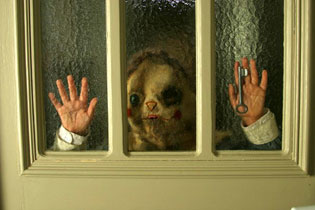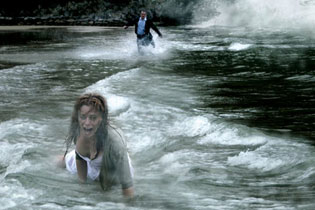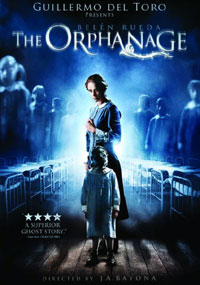Little Simon (Roger PrĖncep), the only child of a wealthy couple (Belen Rueda & Fernando Cayo), has two invisible playmates, which his parents tolerate as a phase. The family has moved into an enormous mansion near the sea, with a no longer functioning lighthouse as part of their view.
 One morning on the beach Simon meets a third playmate who his mother assumes is likewise imaginary. On the way home, Simon leaves a trail of seashells so his new friend can find its way to the mansion. Bad choice. One morning on the beach Simon meets a third playmate who his mother assumes is likewise imaginary. On the way home, Simon leaves a trail of seashells so his new friend can find its way to the mansion. Bad choice.
The mansion had been, years before, an orphanage, hence the film's title The Orphanage(El Orfanato, 2007), in Spanish with English subtitles, & in Spain a recipient of seven Goya Awards.
As the mansion is ready-made for many children to live there, Simon's mom Laura feels the place is perfect for four or five special needs children which she would like to foster. Simon himself is an HIV kid who needs constant attention & medication, & his mom doesn't want him to have to be an only child with only invisible playmates.
Soon Simon claims to have six unseen companions, & promises he'll one day join them, like Peter Pan in Neverland, & never grow up. Mom slowly begins to worry there's more to it than an only-child's disturbing imagination. In fact the campanions seem to have set forth an elaborate game of clues, all of which appear to be sinister.
 During a party, Laura is assaulted bya weird masked child, & afterward, Simon has vanished. Laura & Carlos's lives are turned upside down, idyll transformed to tragedy. During a party, Laura is assaulted bya weird masked child, & afterward, Simon has vanished. Laura & Carlos's lives are turned upside down, idyll transformed to tragedy.
The story gets a mite top-heavy with poor stabs at complications of plot, to the point that it's supposed to be a "revelation" that Laura had once lived in this very orphanage.
There are some gruesome moments -- the death of Benigna (Montserrat Carulla) the old lady is one -- but these seem merely nasty intrusions into what had established itself as quietly mysterious horror.
For the most part this is an aesthetic film, the ghost of the deformed Tomas (Oscar Casas) having that edge of elegance that enhances strangeness.
Geraldine Chaplin as Aurora arrives in the role of the eccentric medium, & some of this subplot alas is mere padding that hasn't anywhere to go. She has a team of psychic detectives who pursue supernatural phenomena, the influence of film adaptations of Richard Matheson's novel Hell House (1971) as The Legend of Hell House (1973) & Shirley Jackson's The Haunting of Hill House (1959) as The Haunting (1963) being palpable.
What had formerly approached atmospheric art becomes hardly more than a workmanlike Poltergeist (1982) or any number of similar films, as a terrible history of slain children begins to unfold. What might've been a perfect film is rendered cluttered & ordinary until these characters are blessedly gotten rid of, & the film returns to its moody tragedy.
\What Laura ultimately does hoping to find her child is not rational but instinctual & born of pain, striving to bring her own childhood friends from beyond the grave, certain as she is that they will know where Simon can be found. What is finally revealed is pretty shocking, & the finale is ineffably bittersweet.
copyright Š by Paghat the Ratgirl
|

 One morning on the beach Simon meets a third playmate who his mother assumes is likewise imaginary. On the way home, Simon leaves a trail of seashells so his new friend can find its way to the mansion. Bad choice.
One morning on the beach Simon meets a third playmate who his mother assumes is likewise imaginary. On the way home, Simon leaves a trail of seashells so his new friend can find its way to the mansion. Bad choice. During a party, Laura is assaulted bya weird masked child, & afterward, Simon has vanished. Laura & Carlos's lives are turned upside down, idyll transformed to tragedy.
During a party, Laura is assaulted bya weird masked child, & afterward, Simon has vanished. Laura & Carlos's lives are turned upside down, idyll transformed to tragedy.